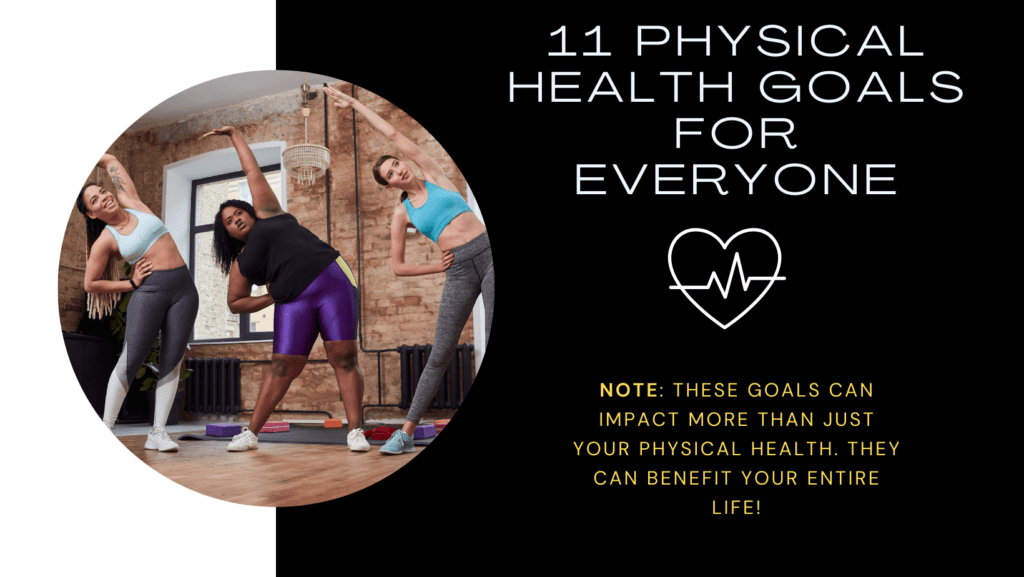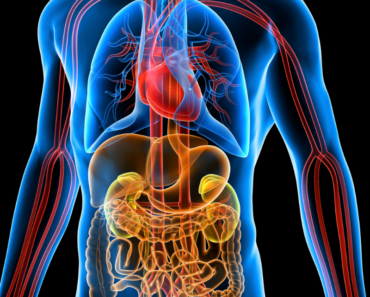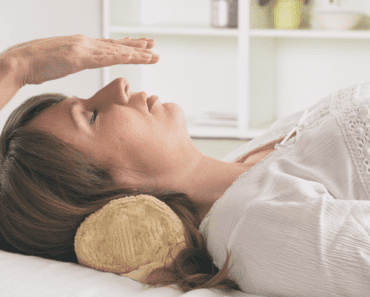Ready to make some physical health goals for the coming year? There are likely some things that you know you want to achieve, such as weight loss, but there other goals focused on physical health that can take your health to another level and impact all other areas of your life positively as well.

1. Lose Weight
Let’s just jump into the most obvious of all the physical health goals – losing weight.
Weight loss is beneficial because it can help the body function more efficiently and reduce the strain on joints, which can prevent injuries and improve overall mobility.
Weight loss offers more benefits than just the physical improvement of feeling trimmer and fitter.
Losing weight can boost your confidence levels and motivate you to seek out new opportunities, both personally and professionally.
It can strengthen relationships with loved ones, as increased energy levels allow you to dedicate more time and attention to those closest to you.
Financially, weight loss translates to saving on healthcare expenses while improving productivity in the workplace.
Weight loss can improve emotional health and reduce the risk of mental health issues such as anxiety and depression.
In short, if you need to lose weight, then weight loss is an important goal that can benefit your entire life.
To achieve this physical health goal, consider:
- Starting with small changes in your diet such as reducing sugary drinks or cutting back on processed foods.
- Incorporating physical activity into your daily routine – whether that’s taking a walk around the block after dinner or joining a gym.
- Setting realistic and achievable weight loss goals for yourself, such as losing 1-2 pounds per week.
- Seeking support from friends, family, or a professional coach to help you stay accountable and motivated.
- Staying consistent and making long-term changes rather than resorting to crash diets or quick fixes.
- Celebrating your progress and not being too hard on yourself if you have setbacks. Remember, weight loss is a journey and it’s important to be patient and kind to yourself throughout the process.
2. Improve Oral Health
Healthy teeth and gums are important for your physical health and should always be one of your physical health goals if you do not have a good routine yet. Poor oral health is linked to various diseases such as heart disease and diabetes.
But good oral health can actually have a positive impact on more areas of your life than just your teeth and gums.
Good oral health can lead to better career opportunities, stronger relationships, improved finances, and even better emotional health.
Taking care of your teeth and gums can help you feel more confident in job interviews, first dates, and other important events.
To improve your oral health, consider:
- Flossing daily to remove plaque and food particles from between your teeth.
- Eating a balanced diet that includes plenty of fruits, vegetables, and whole grains. Avoid excessive consumption of sugar and processed foods.
- Visiting your dentist regularly for cleanings and check-ups. This will help catch any potential issues early on before they become bigger problems.
3. Develop A Better Skin Care Routine
Taking care of your skin is not just about looking good, it’s also important for your overall physical health.
Your skin serves as a protective barrier against germs and other harmful substances. It also plays a role in regulating body temperature and producing vitamin D.
Investing time and effort into a good skin care routine has a ripple effect that can impact other areas of your life, too.
For example, people who take good care of their skin tend to have better luck in their careers and are more likely to attract healthy relationships.
Additionally, taking care of your skin can have positive effects on your emotional well-being, helping to boost your self-esteem and overall mood.
So why not make better skin care one of your physical health goals for this year? It’s a small investment that can pay off in big ways in all aspects of your life.
To develop a better skin care routine, consider the following:
- Wash your face twice a day to remove dirt, oil, and dead skin cells.
- Use a moisturizer daily to keep your skin hydrated and prevent dryness.
- Exfoliate once or twice a week to remove any buildup of dead skin cells.
- Protect your skin from the sun by using sunscreen with at least SPF 30 when spending time outdoors.
- Avoid harsh skin care products and instead opt for natural or organic options that are gentler on your skin.
4. Improve Respiratory Health
Having good respiratory health is essential for living a rewarding and fulfilling life. It’s not just about the physical benefits, but it also has a positive impact on many other areas of your life.
Maintaining good lung capacity will help you feel energized and ready to take on whatever the day brings which helps you participate in any area of your life more fully.
Good respiratory health also means that you’ll be able to partake in all sorts of fun and recreational activities, without feeling out of breath or tired.
To develop better respiratory health:
- Quit smoking: Smoking is one of the biggest contributors to respiratory health issues. Quitting smoking will not only improve your lungs, but also reduce your risk of heart disease and other health problems.
- Exercise regularly: Engaging in physical activity on a regular basis helps to strengthen your lungs and improve their capacity.
- Practice deep breathing exercises: Deep breathing can help increase lung capacity and improve respiratory function.
- Avoid air pollution: Try to limit your exposure to environmental pollutants, such as cigarette smoke or exhaust fumes.
5. Improve Flexibility And Mobility
Improving your flexibility and mobility can have a positive impact on many aspects of your life.
Being more flexible means that you’ll be able to move with ease, whether it’s bending down to pick something up or reaching for an item on a high shelf.
It also reduces the risk of injuries and muscle soreness during physical activities.
With improved range of motion, you may find yourself feeling more confident and energized, which can translate into greater success in both personal and professional realms.
So, whether you’re looking to up your game at the gym or just hoping to tackle your day-to-day activities with ease, investing in improving your flexibility and mobility is a wise physical health goal for anyone.
To improve flexibility and mobility:
- Stretch regularly: Incorporate stretching into your daily routine to increase flexibility and range of motion.
- Practice yoga or Pilates: These types of exercises focus on improving flexibility and mobility through various poses and movements.
- Attend a dance class: Dancing not only helps with flexibility, but it’s also a fun way to stay active.
- Foam roll: Using a foam roller can help release tension in your muscles and improve mobility.
6. Improve Your Cardiovascular Health
By paying attention to your cardiovascular health, you can reduce your risk of heart disease, stroke, and numerous other health problems.
Additionally, when your heart is healthy, you’ll likely notice positive changes in many areas of your life. Perhaps you’ll notice that you have more energy to chase your passions or spend time with loved ones. Or maybe you’ll find that your mood is improved, leading to less stress and a more positive outlook on life.
Regardless of how you experience it, optimal cardiovascular health is a game-changer that can positively impact all areas of your life.
To improve your cardiovascular health:
- Engage in regular aerobic exercise: Aim for at least 30 minutes of moderate to vigorous aerobic activity, five days a week. You can choose activities like running, swimming, or cycling.
- Eat a heart-healthy diet: Fill your plate with plenty of fruits, vegetables, whole grains, lean proteins and healthy fats.
- Manage stress levels: Find healthy ways to cope with stress, such as practicing yoga or meditation.
- Get enough sleep: Aim for 7-9 hours of quality sleep each night to allow your body to rest and recharge.
7. Improve Overall Strength
Improving overall strength can do more than just make you look good. In fact, it can positively impact all aspects of your life.
Strength training can help boost your energy levels, making it easier to tackle the many tasks you need to accomplish on a daily basis.
You will be able to help others in your professional and personal life with heavy activities that they may not be able to do, such as moving or lifting things.
Additionally, with improved strength comes better balance and coordination, making it less likely for you to experience falls or accidents.
Ways to improve your overall strength:
- Incorporate strength training exercises into your workout routine, such as squats, push-ups, and lunges.
- Use resistance bands or weights to increase the challenge in your workouts.
- Don’t be afraid to increase the intensity gradually to avoid injury.
8. Improving Your Diet
Improving your diet is a physical health goal that can have a massive impact on all areas of your life.
Eating a nutritious diet packed with whole foods can leave you feeling energized and full of vitality, making it easier to tackle daily tasks with enthusiasm.
A well-balanced diet can also improve cognitive function, helping you think more clearly and make better decisions.
In addition to these benefits, maintaining a healthy diet can help to reduce the risk of chronic diseases such as heart disease and diabetes.
Making small changes to your diet can seem daunting, but with the right resources and support, it’s easier than you think to start making positive changes that will benefit all aspects of your life.
How to improve your diet:
- Focus on incorporating more whole foods into your meals, such as fruits, vegetables, lean proteins, and healthy fats.
- Limit processed and sugary foods to occasional treats.
- Consider working with a registered dietitian for personalized guidance and support.
9. Improve Your Sleep
Getting better sleep is one of those physical health goals that can be a challenge with a busy schedule, but it is worth it as it can have a positive impact on all areas of your life.
By improving your sleep, you may find that you have more energy to tackle your tasks and goals, better focus and concentration, and improved mood.
Your physical health can also benefit from better sleep, as it helps keep your immune system strong and can reduce your risk of chronic diseases.
Your career will benefit because you’ll be more productive and alert at work, which can result in better job performance.
How to improve your sleep:
- Set a consistent bedtime and wake-up time each day.
- Create a relaxing bedtime routine that includes turning off electronic devices an hour before bed.
- Make sure your sleeping environment is dark, cool, and comfortable.
10. Strengthen Your Bones
When we make an effort to strengthen our bones, we’re doing our future selves a huge favor, as the risk of developing debilitating bone disorders like osteoporosis significantly decreases.
This means we can have a better quality of life and be less dependent on others as we age. But the benefits don’t stop there.
Because strong bones help support our posture, we’re less likely to experience back pain or other discomforts.
And when our bodies feel good, our minds and moods follow suit, impacting everything from our confidence to our social lives.
To strengthen your bones:
- Incorporate weight-bearing exercises like walking, jogging, dancing, or weightlifting into your routine.
- Consume calcium-rich foods like dairy products, leafy greens, and fortified grains to support bone growth and maintenance.
- Get enough vitamin D from sunlight exposure or supplements to aid in the absorption of calcium.
11. Practice Better Hygiene
Maintaining proper hygiene has always been crucial to our wellbeing, but recent events have shown us how vital it can be for our overall health. It’s one of the physical health goals that many people never considered before but now is very popular.
Hygiene practices like washing your hands and cleaning frequently touched surfaces can help prevent the spread of germs and reduce the risk of illness. But the benefits of good hygiene go beyond just physical health – it can also improve our mental and emotional wellbeing.
When we practice good hygiene, we feel more confident, comfortable, and in control.
Additionally, good hygiene habits can have positive impacts on our social lives, work environments, and personal relationships.
By making hygiene a priority, we can create a happier and healthier life for ourselves and those around us.
You can practice better hygiene by:
- Washing your hands regularly with soap and water for at least 20 seconds, especially before preparing food or eating, after using the bathroom, and after being in public spaces.
- Disinfecting frequently touched surfaces like doorknobs, phones, and keyboards to reduce the spread of germs.
- Keeping a clean and organized living space to promote better mental health and reduce the risk of illness.
- Maintaining personal hygiene practices such as showering regularly, brushing your teeth twice a day, and changing into clean clothes daily.
Choose a few physical health goals to set for yourself. Remember that small changes and consistent efforts can lead to long-term benefits.





